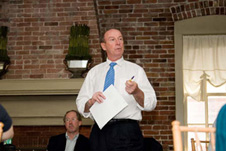3Qs: Style and statement

The race for the Republican presidential nomination is heating up and communication style will play no small part in deciding a winner. We asked Richard Katula, professor of communication studies and expert in political rhetoric, to explain why communication is so important and analyze the communication skills of the 2012 GOP presidential candidates.
How important are communication skills to presidential campaigns and elections?
Sadly, but truly, money and organization come first in importance. The last four U.S. presidential elections (Clinton-Dole, Bush-Gore, Bush-Kerry, and Obama-McCain) were won by the candidate who spent the most money and ran the smoothest campaign.
Theory and strategy come next. Whichever campaign has the right theory and a strategy to match, will win. Having a theory and a strategy that governs the campaign from start to finish is critical.
Communication is the key to both of these. Candidates must appeal to voters not only to vote for him, but also to support him with money. Monetary support solidifies a vote and gives a candidate the wherewithal to put his message out. Sharpening campaign messages so that each one conforms to the theory and strategy of the campaign is essential. Each candidate must speak in sound bites (short, pithy remarks that the media can repeat) and avoid getting “off message” by making a mistake. Words are a commodity in campaigns and so they must be chosen carefully. We teach our communication students to control the message, because by so doing, they persuade most effectively and most efficiently.
Of the Republican presidential candidates, who do you consider to be the most effective communicator? Why?
Communication involves both style and content. Style is the way you say it, content is what you say. All of the candidates except Perry have sharpened their styles in the debates and in Iowa or New Hampshire. Perry, by stumbling and making errors, is the only one who has eliminated himself simply because of style. That leaves six still standing: Romney, Gingrich, Paul, Bachmann, Santorum and Huntsman. Because they are second-tier candidates, Bachmann, Santorum and Huntsman have directed their message at Iowa (Santorum and Bachmann) or New Hampshire (Huntsman) voters. This strategy is based on the fact that they have to do well in Iowa or New Hampshire to stay in the race. If they don’t do well in the early states, their money and their credibility will dry up. So Bachmann and Santorum, for instance, focused on shoring up their religious credentials and their family values in their communications because Iowa caucus-goers are 50 percent evangelical, values voters. They are addressing a specific audience on character issues and, to a lesser extent, on substantive issues.
Romney, Gingrich, and Paul are running national campaigns because their numbers in Iowa and New Hampshire and their campaign treasuries assured them of remaining viable beyond these first two states. Thus, they have attacked Barack Obama in their ads and in the debates, and generally addressed a universal audience on the bigger, more substantive issues of the campaign. On the substantive issues, Romney seems the most articulate, but they have all heeded the first rule of the art of communication: You persuade insofar as you say the right thing to the right audience at the right time.
How does Romney compare to Obama?
Romney compares well to Obama. Both are highly articulate, and both look presidential. In terms of style, they are both formidable communicators. Because of the debates, Romney is getting tougher at withstanding attacks and maintaining his composure. This will be a big advantage in the presidential debates. Both Al Gore in 2000 and then George Bush in 2004 lost their composure and appeared arrogant in the first presidential debate. Gore never recovered, and Bush regained his composure, but both candidates lost their edge by losing their cool in the first debate. Be on the lookout for this with Obama.
Both Romney and Obama have sharpened their talking points on the substantive issues of the campaign to make them ambiguous enough for their base constituents and for Independent voters in the swing states, the ones who will decide this election.




